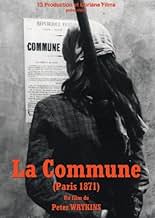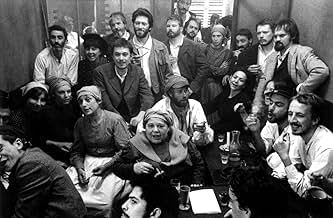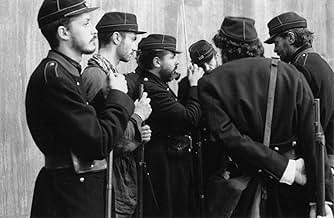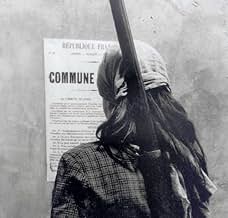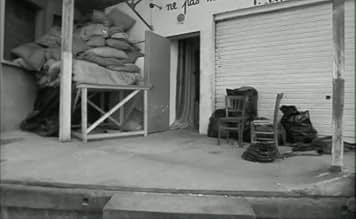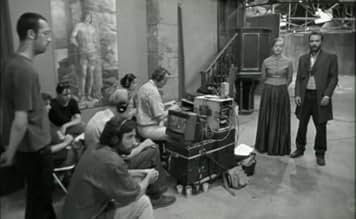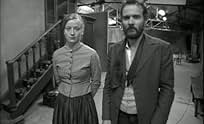AVALIAÇÃO DA IMDb
8,0/10
1,4 mil
SUA AVALIAÇÃO
Adicionar um enredo no seu idiomaIn this war drama blurring the lines between documentary and fiction, the working class and the bourgeoisie of 19th century Paris are interviewed and covered on television, before and during... Ler tudoIn this war drama blurring the lines between documentary and fiction, the working class and the bourgeoisie of 19th century Paris are interviewed and covered on television, before and during a tragic workers' class revolt.In this war drama blurring the lines between documentary and fiction, the working class and the bourgeoisie of 19th century Paris are interviewed and covered on television, before and during a tragic workers' class revolt.
- Direção
- Roteiristas
- Artistas
- Prêmios
- 1 vitória e 1 indicação no total
- Direção
- Roteiristas
- Elenco e equipe completos
- Produção, bilheteria e muito mais no IMDbPro
Avaliações em destaque
I don't think this is Peter Watkins's "best" film, exactly. It lacks the discipline and precision of "Edward Munch." But this is the purest example of the potential of Watkins's practice. Few films I've ever seen have felt as alive as a collaboration between a director and a group of performers. The non-actors, denizens of a working-class neighborhood of Paris, lived together and collaborated with Watkins as a legit, studio-based commune during their re-enactment of the events of Paris, 1871. In the film's second half, the reenactment subtly starts to occasionally give way to conversations between the performers during the course of the production. The past starts to seem truly "re-enacted," as the "present" seems to become part of a work of historical story-telling. In the final scenes, the actors seem to go into a kind of trance of fury as they sing revolutionary songs while awaiting to defend the city from Versailles' soldiers. Many turn to the camera and say that they would pick up guns to fight for a new commune in the present. As a viewer, I believed them.
This film also goes farther in its critique of media than Watkins' earlier films. All of Watkins's films feature a contemporary documentary camera crew interviewing historical figures in a way that is quite confrontationally unnatural. In the previous films, the (seemingly) Watkins-led camera crews were portrayed as the allies of "the people." Here, the larger canvas allows for a more nuanced critique of even "people's media." Two media outlets vie for the hegemony of the viewer: Versailles News and Commune TV. Even Commune TV, the "ragtag, independent" news outlet is presented as always veering towards the most relatively conservative seats of power. The Commune reporters consistently defend the (I think rather inappropriately maligned) "professional" Commune leadership from the masses. (As much as I admire Watkins, he is undeniably an ultra-leftist.) I wonder, however, if this more complex take on the media is not tied to the more complex layerings of "realities" in this work that I discussed in my first paragraph. For, unlike, in the earlier films, here the "progressive" media outlet (Commune TV) is not the "highest" reality, and therefor is not directly attached to Watkins himself. It is only part of the historical fiction that Watkins implements to show his performers embrace the political heritage of the Commune. In the scenes where the performers discuss their experiences of the production with each other, Watkins name is only ever mentioned with reverence. The filmmaker deepens his critique of media, but not of his place within it as a "radical saint."
This film also goes farther in its critique of media than Watkins' earlier films. All of Watkins's films feature a contemporary documentary camera crew interviewing historical figures in a way that is quite confrontationally unnatural. In the previous films, the (seemingly) Watkins-led camera crews were portrayed as the allies of "the people." Here, the larger canvas allows for a more nuanced critique of even "people's media." Two media outlets vie for the hegemony of the viewer: Versailles News and Commune TV. Even Commune TV, the "ragtag, independent" news outlet is presented as always veering towards the most relatively conservative seats of power. The Commune reporters consistently defend the (I think rather inappropriately maligned) "professional" Commune leadership from the masses. (As much as I admire Watkins, he is undeniably an ultra-leftist.) I wonder, however, if this more complex take on the media is not tied to the more complex layerings of "realities" in this work that I discussed in my first paragraph. For, unlike, in the earlier films, here the "progressive" media outlet (Commune TV) is not the "highest" reality, and therefor is not directly attached to Watkins himself. It is only part of the historical fiction that Watkins implements to show his performers embrace the political heritage of the Commune. In the scenes where the performers discuss their experiences of the production with each other, Watkins name is only ever mentioned with reverence. The filmmaker deepens his critique of media, but not of his place within it as a "radical saint."
Other viewers' comments (thus far) encapsulate most of my feelings about this amazing film (shot on high-quality B&W video, actually). I would add that La Commune divides naturally into two parts, and would be comparatively easy viewing on different nights. The most dramatic moments, obviously, are in the second half - not just the scenes of the Communards defending Paris, but seeing more of the actors commenting on the project, which is when Watkins' strategy of having them react "as" the people they are portraying rather than simply giving them lines to read, really pays off. Personally, I'm glad I was able to see the whole thing build up to those moments.
But however you decide to do it, see La Commune. It will move you and make you think about your (very real!) ability to be a political actor, to make a difference, to take control of your life, even in a terrible time like the present. To use a much overused word, it's empowering.
But however you decide to do it, see La Commune. It will move you and make you think about your (very real!) ability to be a political actor, to make a difference, to take control of your life, even in a terrible time like the present. To use a much overused word, it's empowering.
Peter Watkins' nearly 6-hour long docudrama, "La Commune (Paris, 1871), is a surprisingly passionate and fast-moving lesson in history. It is also a brilliant demonstration of how history is shaped, and re-shaped, by the tellers of the tale.
Using the "You Are There" approach of earlier radio and TV days, Watkins has a male and female news team from "Commune TV" wandering through the poorest district of Paris inviting people to express their grievances against the state to the camera.
While the people bitterly suffer because of the government's inept defeat at the hands of the Germans during the Franco-Prussian War, their anger inspires solidarity for them throughout Paris, and although they briefly rise up and seize power, they are brutally put down in the end.
Ironically, during the course of their uprising, a TV monitor in the background features happy-talk "Versailles TV" news anchors, who continually vilify the Communards and rationalize the government's brutal acts of suppression.
"La Commune (Paris, 1871)" is a must-see for students of history, and a must-see for students of the media.
Using the "You Are There" approach of earlier radio and TV days, Watkins has a male and female news team from "Commune TV" wandering through the poorest district of Paris inviting people to express their grievances against the state to the camera.
While the people bitterly suffer because of the government's inept defeat at the hands of the Germans during the Franco-Prussian War, their anger inspires solidarity for them throughout Paris, and although they briefly rise up and seize power, they are brutally put down in the end.
Ironically, during the course of their uprising, a TV monitor in the background features happy-talk "Versailles TV" news anchors, who continually vilify the Communards and rationalize the government's brutal acts of suppression.
"La Commune (Paris, 1871)" is a must-see for students of history, and a must-see for students of the media.
Peter Watkins stands at the base of a form of historical documentaries known as 'documentary reconstruction'. Lightly based on battle re-enactments, Watkins hires amateur actors to play the roles of common people in the Paris of 1871. Famine and civil unrest cause a popular revolution, supported by followers of Karl Marx. The people take power and form a Commune, a communist government. After a few weeks, the official Versailles government regains the city by force, and tens of thousands of people are executed.
Watkins' historical drama is based on the common people, which are shown in their everyday life. To do this, he introduced an anachronism: in the 1871 context, the people form a tv station. The Versaillais also have their official tv station. This way, the documentary becomes both a social project and a media experiment.
Watkins' historical drama is based on the common people, which are shown in their everyday life. To do this, he introduced an anachronism: in the 1871 context, the people form a tv station. The Versaillais also have their official tv station. This way, the documentary becomes both a social project and a media experiment.
This is a pretty exhilarating idea.
Take a period in history where its all about collective points of view. In other words, select a time where the movies chosen by groups clash. Its better if it a time before movies and in a place that believes they know something about movies.
Introduce it as a movie, with interviews first with actors and then with characters. Then, action (with characters glancing at the camera), but wait.
Soon we see that inside the movie, we will see reporting by a TeeVee news crew. This is displayed in two forms within the film.. We see the news broadcast and the Parisans watching it.
They are of course biased in favor of the royalist government. So just as the rabble revolt against the government, we have an alternative TeeVee crew enlisted, who also go around interviewing the crowd as well, all obviously amateur actors, not starving, not sick, toothless and in pain.
We are introduced to characters who introduce themselves as fictional characters. We see the two TeeVee reporters take on the character of the events we see, and get blamed for the whole thing, history writing itself. It is the only example I know of this particular type of fold, where our notion of history as retrospective watching is folded into on-screen watchers.
But at so many hours, its a long slog because there is some conflating of French history with French film history, and its just not as profound as they suppose.
Ted's Evaluation -- 2 of 3: Has some interesting elements.
Take a period in history where its all about collective points of view. In other words, select a time where the movies chosen by groups clash. Its better if it a time before movies and in a place that believes they know something about movies.
Introduce it as a movie, with interviews first with actors and then with characters. Then, action (with characters glancing at the camera), but wait.
Soon we see that inside the movie, we will see reporting by a TeeVee news crew. This is displayed in two forms within the film.. We see the news broadcast and the Parisans watching it.
They are of course biased in favor of the royalist government. So just as the rabble revolt against the government, we have an alternative TeeVee crew enlisted, who also go around interviewing the crowd as well, all obviously amateur actors, not starving, not sick, toothless and in pain.
We are introduced to characters who introduce themselves as fictional characters. We see the two TeeVee reporters take on the character of the events we see, and get blamed for the whole thing, history writing itself. It is the only example I know of this particular type of fold, where our notion of history as retrospective watching is folded into on-screen watchers.
But at so many hours, its a long slog because there is some conflating of French history with French film history, and its just not as profound as they suppose.
Ted's Evaluation -- 2 of 3: Has some interesting elements.
Você sabia?
- Versões alternativasIn December 2002 Peter Watkins started the editing of an abridged theatrical version. In a prologue he expresses his views on discovering that the production company, 13 Production, has financial links with the Lagardère Group (which sells Military Weapons through Matra), then he warns the audience about how much of the sequence shots and live debates from the original full-length movie have been lost in the process of reducing the running time by more than 2 hours to 3 hrs 1/2.
- ConexõesFeatured in The Universal Clock: The Resistance of Peter Watkins (2001)
Principais escolhas
Faça login para avaliar e ver a lista de recomendações personalizadas
- How long is La Commune (Paris, 1871)?Fornecido pela Alexa
Detalhes
Bilheteria
- Faturamento bruto nos EUA e Canadá
- US$ 5.340
- Fim de semana de estreia nos EUA e Canadá
- US$ 2.930
- 6 de jul. de 2003
- Faturamento bruto mundial
- US$ 21.641
- Tempo de duração
- 5 h 45 min(345 min)
- Cor
- Mixagem de som
- Proporção
- 1.66 : 1
Contribua para esta página
Sugerir uma alteração ou adicionar conteúdo ausente

